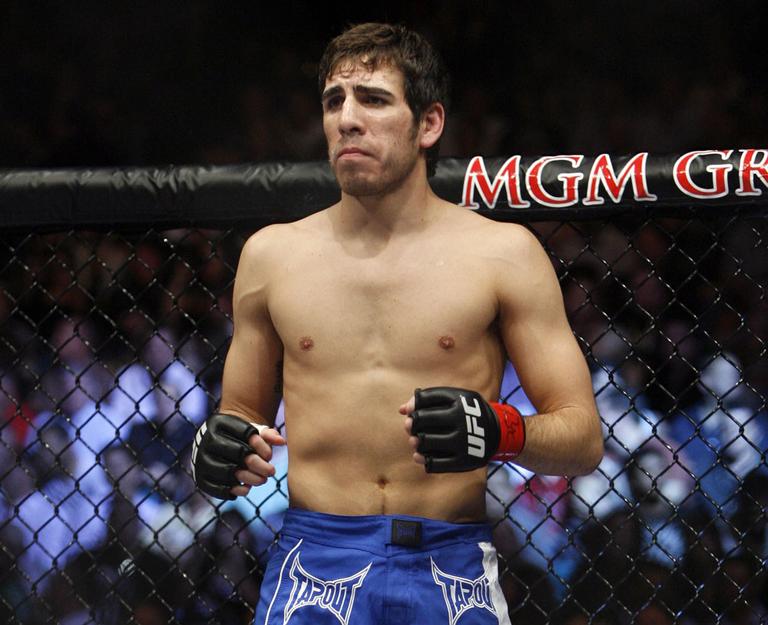Advertisement
Local UFC Fighter Defends Controversial Sport
ResumeFor Kenny Florian, getting the crap kicked out of him is a dream come true.
The Ultimate Fighting Championship — a mix of martial arts, boxing and wrestling — is making its debut in Boston this weekend with a fan expo at Hynes Convention Center and a main event at the TD Garden.
Florian, 34, a native of Westwood and Dover, has been a professional mixed martial arts competitor for about six years. This weekend he becomes a UFC fighter.
"I think for any kid growing up it’s always their dream to be able to play in the biggest arena on the biggest stage in their hometown," Florian said, raising his voice over the din of practicing fighters. "I get to go out there and live my dream.”

Just nine years ago, another Massachusetts native, Dana White, bought the Ultimate Fighting franchise for $2 million. Since then, the UFC brand has grown tremendously. It's now worth over $1 billion.
Florian attributes the sport’s rise in popularity to cable television and a rabid fan base. “People who are into this sport are really into this sport,” he said. “It’s unbelievable.”
Last fall, Massachusetts lawmakers lifted a ban on UFC-like sporting events when the Legislature overwhelmingly approved a proposal to form a new mixed martial arts oversight commission. Florian says mixed martial arts, condemned by many as “barbaric” and “human cockfighting,” has gotten a bad rap from politicians.
“There are a ton of rules — you can’t kick to the groin, or touch the eyes, or anything,” Florian said. “It’s not a no-holds-barred type of fight, which was the way it was billed originally. I think the sport has suffered somewhat from its original marketing. It’s about educating people as best we can.”
A typical UFC match consists of three five-minute rounds, during which the competitors can use any number of fighting styles: jujitsu, karate, boxing or wrestling, to name a few. The fighters enter an eight-sided cage (dubbed “The Octagon”) and fight until a submission, knockout or round-end.
“I consider it a form of human kinetic chess,” he said. “There’s a lot of strategy – I’ve been training about 14 years; there’s so much preparation involved.”
Nevertheless, Florian does admit it can get pretty gory. “I have to be honest, it’s easier to get cut in this sport, so there is a little bit more blood than you’d see in boxing, typically. The blood is what turns people off sometimes.”
“It’s almost an obsession, as far as training and really perfecting my art."
UFC fighter Kenny Florian
Florian isn’t someone you’d expect to see in the Octagon on fight night: the 5-10 lightweight is thoughtful, energetic and all smiles. A Boston College graduate with a major in communications, Florian worked in the financial industry before dedicating his career to mixed martial arts in 2003.
“I don’t consider myself a fighter, necessarily; I consider myself a martial artist,” he said. “I’ve found incredible benefits from participating in the martial arts and competing in this one-on-one type of challenge. I think you learn a lot about yourself, you learn a lot of discipline, and you really improve yourself as a person.
“It’s become this intense pursuit of perfection for me. It’s almost an obsession, as far as training and really perfecting my art, and making sure everything is as technical as it can possibly be.”
One thing is sure: the job pays well. As one of a few hundred UFC fighters under contract, Florian can make $4,000-$50,000 a fight, not including bonuses or pay-per-view profits.
So how does Florian pitch the fight to public radio listeners?
“It’s almost like if you were attempting to get your PhD in English literature, and biology, and calculus, and trying to put it all together and give a lecture in about a hour.”
Besides, Florian continued, everyone is a fighter. “Since the beginning of time we’ve always admired that gladiator out there, fighting,” he said. “I think that’s because we all have the fighter in us in some way. We're all fighting for something.”
This program aired on August 27, 2010.